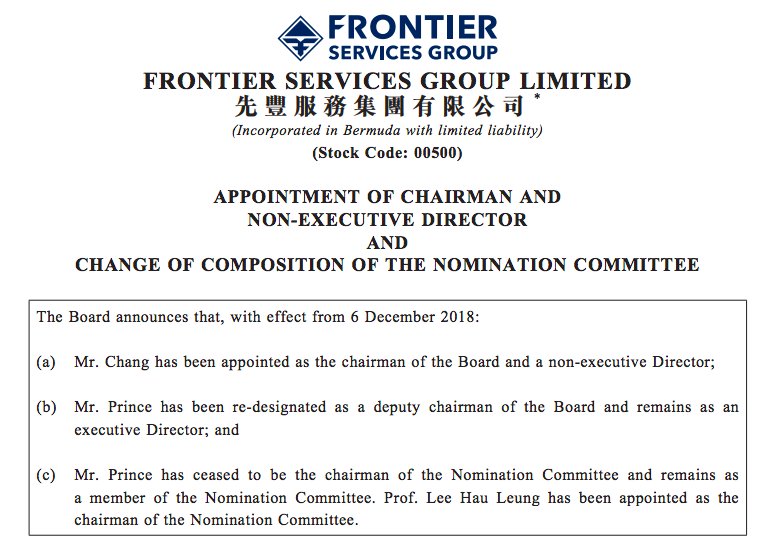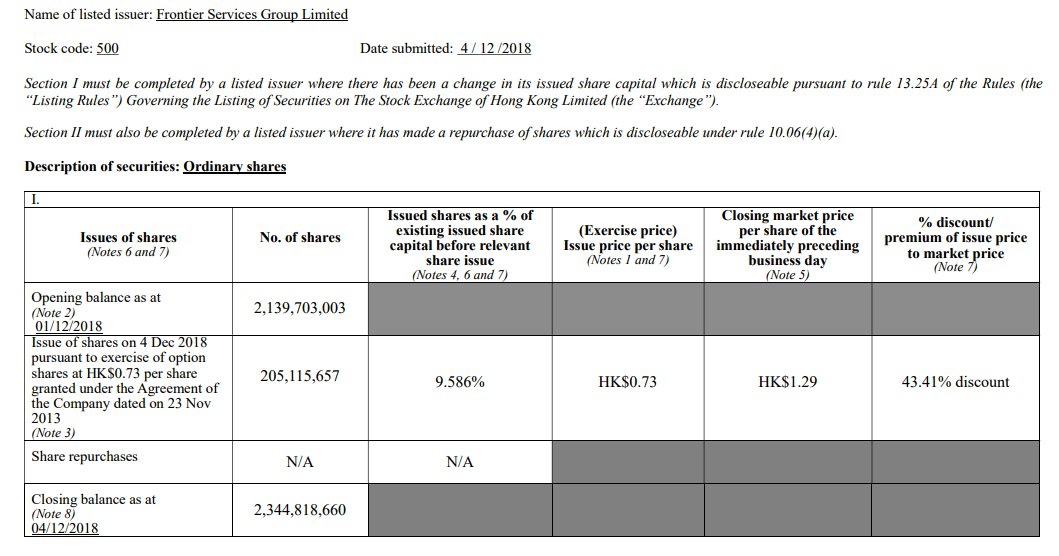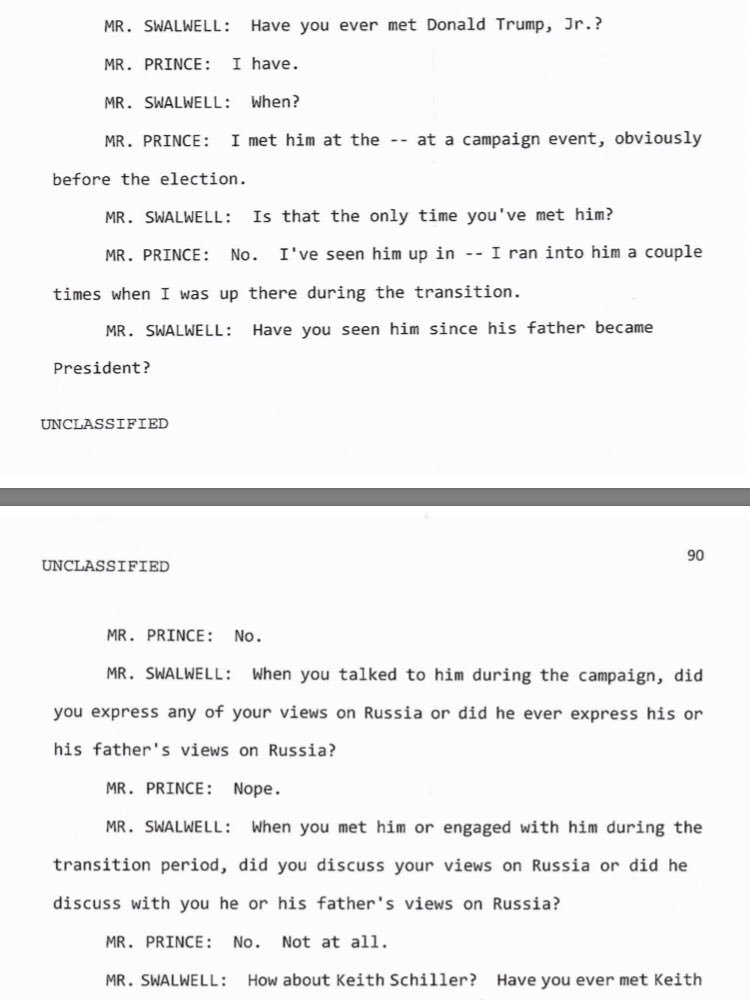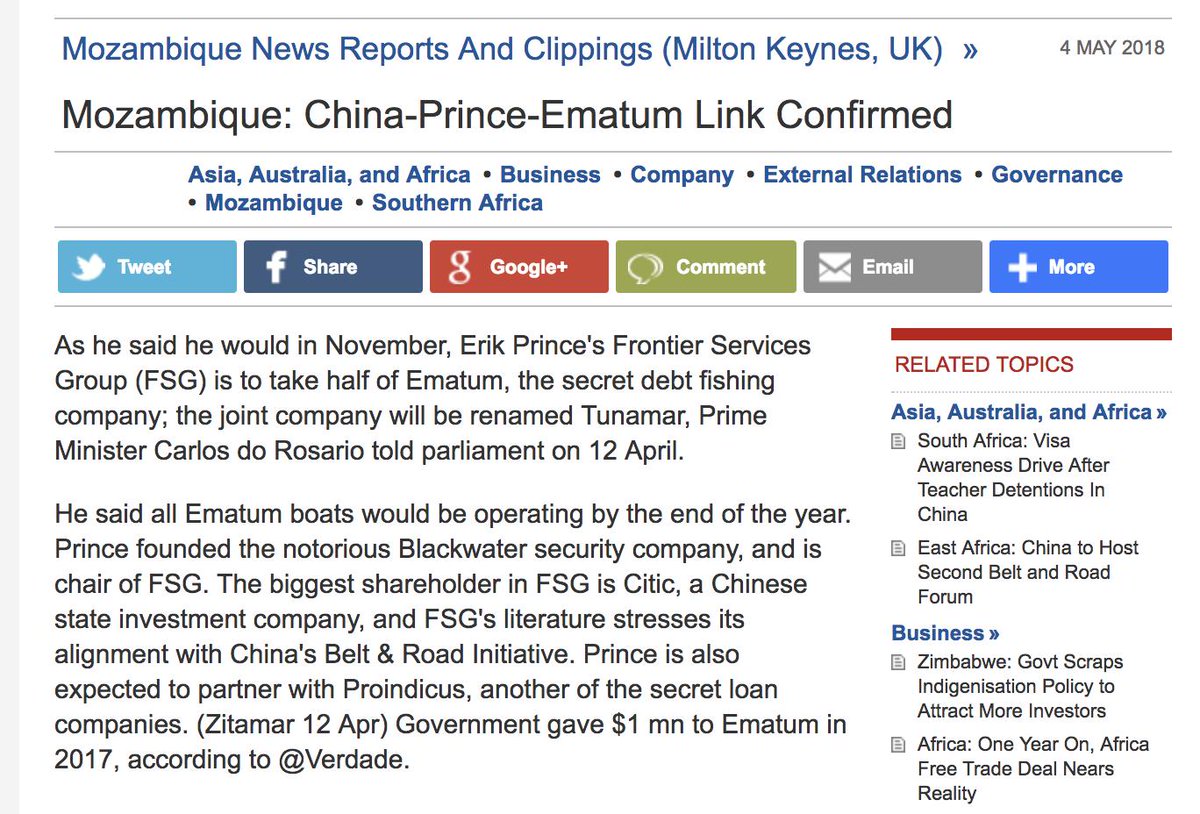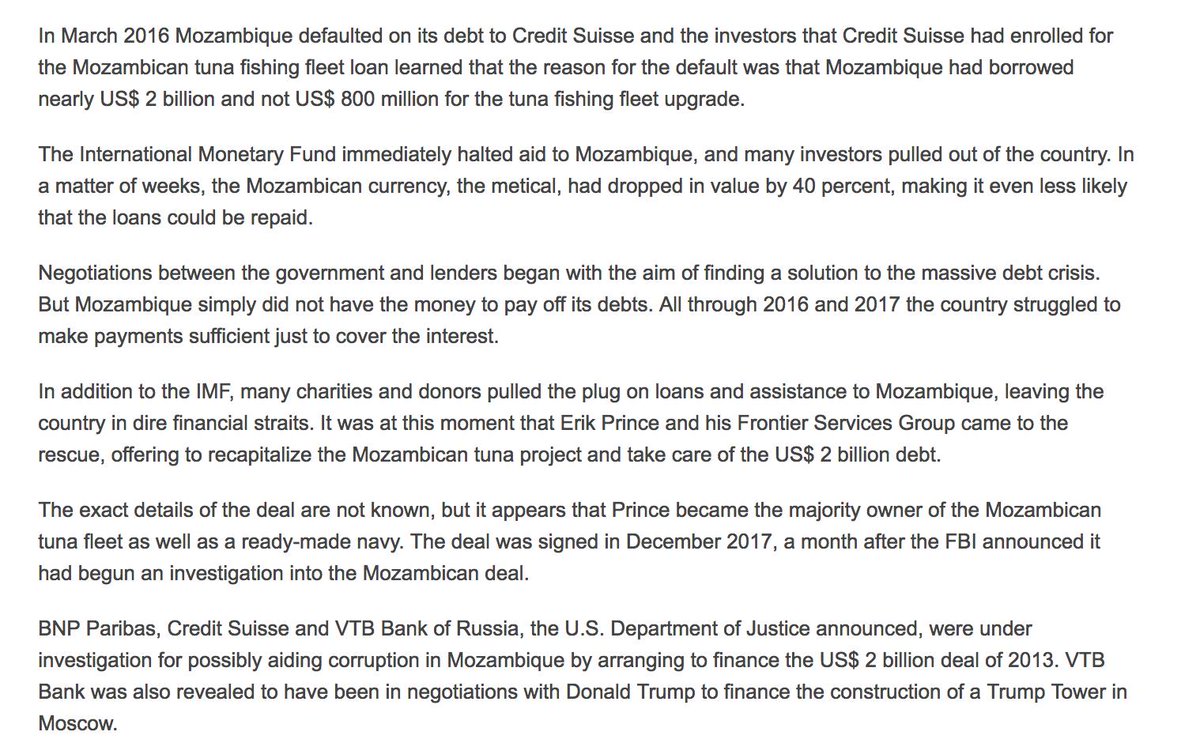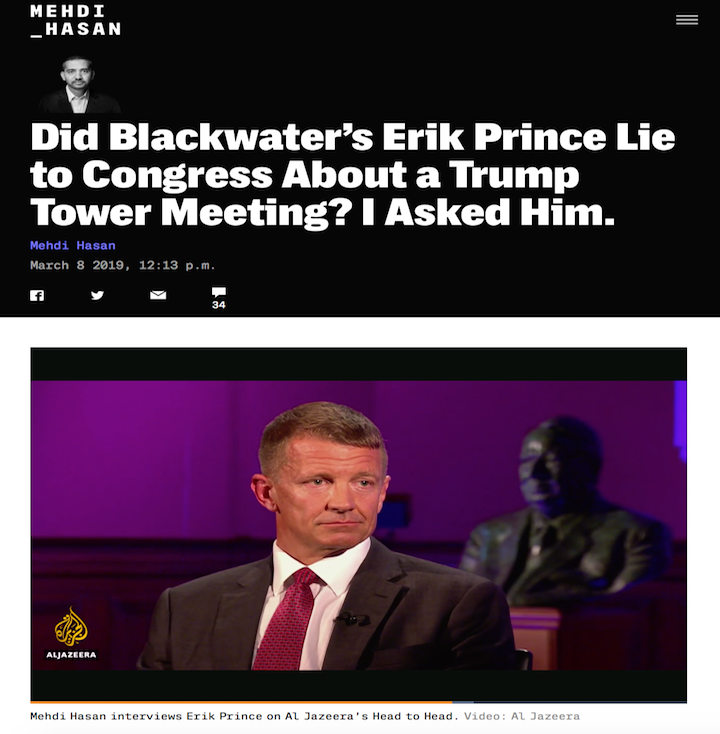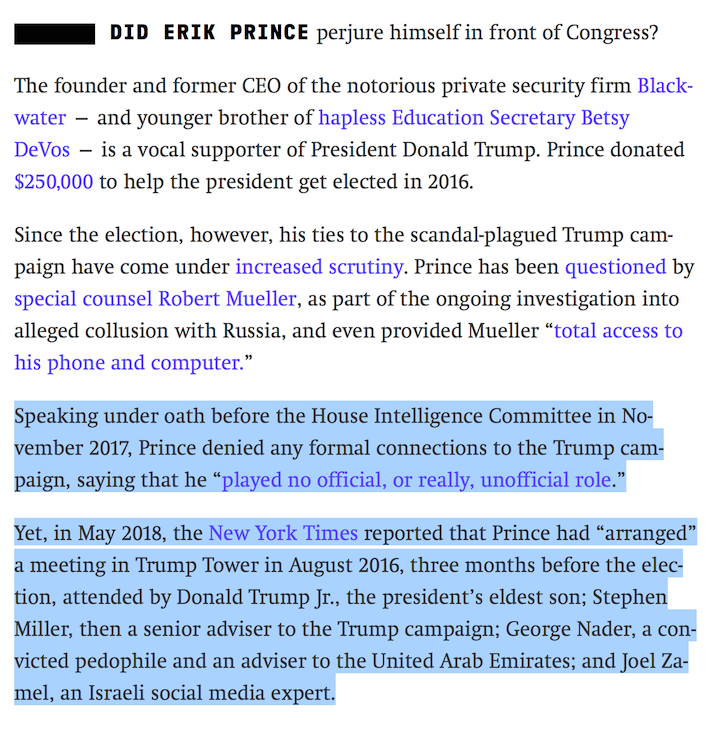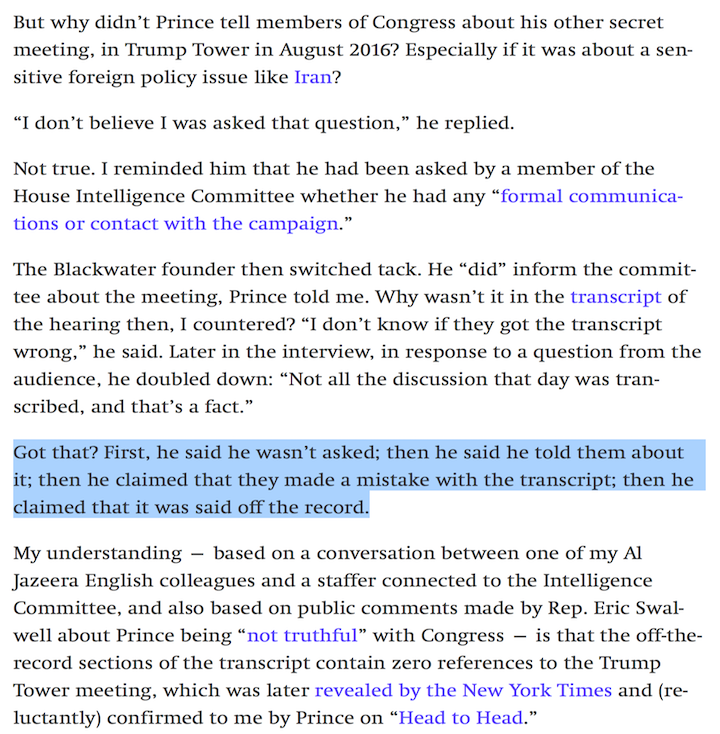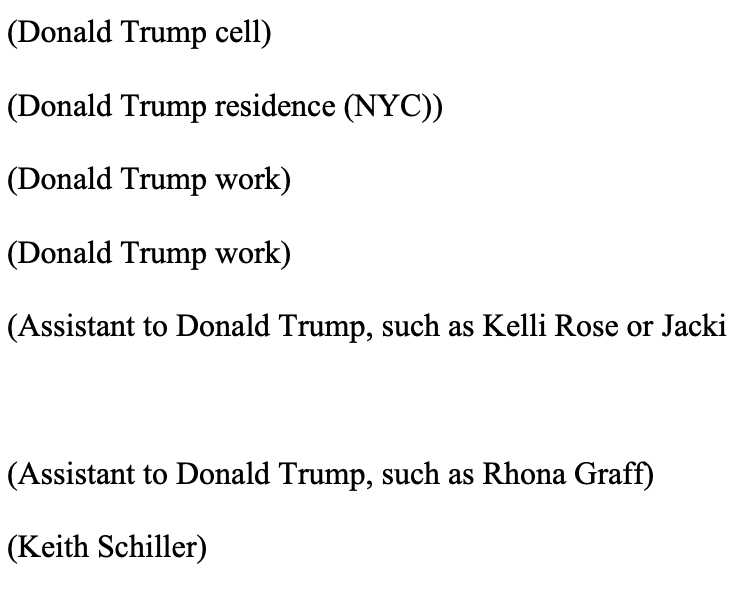A fresh look at Erik Prince’s House Intelligence Committee testimony and emails with Christophe Charlier, Chairman of Russian company Renaissance CapitalCommittee members asked Prince about Glencore, the UAE’s Mubadala fund, his former employee Joe Schmitz and his relationship to Charlier and Russian billionaire Mikhail Prokhorov.Wendy Siegelman
Jun 10, 2018
This past week Rep. Adam Schiff, the top Democrat on the House intelligence committee, released a letter he had sent to Rep. Devin Nunes requesting that the committee provide Special Counsel Mueller transcripts of all interviews conducted during the Trump-Russia investigation. Schiff raised concerns that:
“certain witnesses may have testified untruthfully before our committee, and believe that Mr. Mueller should consider whether perjury charges are warranted.”
While the transcript of Erik Prince’s November 2017 testimony to the House Intelligence Committee was publicly released (excluding one part that was ‘off the record’), new reporting has called into question the veracity of Prince’s testimony. It seems likely that Prince is one of the witnesses Schiff referred to in his letter.
Recent news stories have added additional context to some sections of Prince’s testimony, and there are a few key parts of the transcript that have not been widely reported on that raise questions worth further investigation.
Erik Prince’s Emails with Christophe Charlier
There has been surprisingly little reporting on multiple references in Prince’s testimony to 23 pages of material Prince provided to the committee that included emails exchanged with Christophe Charlier. Prince had previously provided the documents to the Senate in response to a request for communications he had with any Russian national from approximately 2016 to 2017. Although Prince was not sure if Charlier was a Russian national, he described the emails this way:
MR. PRINCE: Yeah. The first email, as I recall, dates from November, end of November 2016. And he is emailing me, congratulating me on the appointment of my sister to be Secretary of Education. And then the rest of the communications were in 2017.
And Mr. Charlier runs an investment bank with an office in Russia.
And he lives between the U.K. and Switzerland, I recall. And that
investment bank focuses on natural resources, fundraising, capital,
debt equity, mergers and acquisitions kind of stuff. (p.33)
Christophe Charlier is Chairman of Renaissance Capital, an “emerging and frontier markets investment bank” founded in 1995 by a group that included New Zealander Stephen Jennings, who departed in 2013 after the firm was sold to Russian billionaire Mikhail Prokhorov’s Onexim Group. Renaissance Capital’s website describes operations in Sub-Saharan Africa, Russia, the Middle East and Asia, all regions — with the exception of Russia —similar to those where Erik Prince is known to do business. Prince said he first met Charlier around 2012–2013 when he was looking for help raising equity for a project in Africa.
Rep. Jackie Speier asked Prince about Charlier’s boss, Mikhail Prokhorov and his involvement with Oleg Deripaska’s aluminum company Rusal, where Prokhorov had served as a board member and his company Onexim had owned 14% of Rusal. Prince denied knowledge of Rusal and said about Prokhorov: “I might have met him in passing, but I had no business dealings with him at all.”
Rep. Speier then asked Prince about Renaissance Capital:
MS. SPEIER: So press reports indicate that this firm has
employed a string of former KGB spies and received millions of British pounds as part of a giant fraud being investigated by Sergei Magnitsky, the individual found dead in a Russian prison. Were you aware of that?
MR. PRINCE: No. Christophe is the only guy I ever met from the firm. (p.73)
An August 2017 Telegraph article described Renaissance Capital as a firm that “has employed a string of former KGB spies” and:
“£6 million from funds at the centre of a giant fraud which was being investigated by Sergei Magnitsky has allegedly been traced to a UK bank account held by Renaissance Capital.”
The U.S. Department of Justice had traced proceeds of the fraud to a bank account in Bournemouth held by Renaissance Capital Investment Management Ltd. However, the article notes that prosecutors “have not alleged that Renaissance was aware of or complicit in the original crime.”
The Telegraph lists several senior Renaissance Capital employees with prior experience in the KGB and FSB:
Yuri Sagaidak, a KGB spy expelled from Britain in 1989, was the firm’s deputy general director until at least 2005.
Vladimir Dzhabarov, former acting head of financial intelligence at its successor the FSB, was appointed vice president in 2006.
Yuri Kobaladze, a former KGB general, was Renaissance’s managing director from 1999 until early 2007.
Although these examples are a decade old, there is a very recent significant story involving a senior employee of Renaissance Capital who also worked as an FSB officer.
In March 2017 the U.S. Department of Justice announced the indictment of Igor Sushchin and three other people for the 2014 Yahoo hack which impacted 500 million user accounts — a theft that appeared to be the world’s largest known cyber breach. Igor Suschin, described in the indictment as an FSB officer, had been working at Prokhorov’s Renaissance Capital, managed by Charlier, at a division called Renaissance Broker, and was fired the day after the indictment was announced. Suschin’s job was “head of information security at the Russian financial firm, where he monitored the communications of Russian financial firm employees.”
Rep. Speier moved on to questions about an email from Charlier discussing the Swiss commodity and mining company Glencore, which highlights how Prince and Charlier discussed important strategic plans related to Prince’s business:
MS. SPEIER: Okay. Who is Cyrus Behbehani from Glencore, and
what is your relationship with him?
MR. PRINCE: He works for Glencore, and someone I have talked to
before about commodities.
MS. SPEIER: So in this email on June 28, Charlier asked you, do
you ever interact with Glencore? I know someone, whose name is blotted out, quite well as we sat on the RUSAL board together. He could be interested, acquirer from -- for your African businesses. At the right time for you, I would like my team to take a look at these businesses and see if we can come up with interesting ideas.
And you wrote back, "I don't know Ivan, but do you know," and
that's referencing Cyrus Behbehani. So -- (p.74)
When Mikhail Prokhorov left the board of Oleg Deripaska’s company Rusal, Charlier took his place as a director alongside Ivan Glasenberg, the CEO of Glencore. It appears that Ivan Glasenberg is the person Charlier suggests could be interested in acquiring Erik Prince’s African businesses. And Charlier indicates that he would like his team to look at Prince’s businesses, indicating a potential future business interaction.
Erik Prince wrote to Charlier that he did not know Ivan, but he did know Cyrus Behbehani at Glencore. Behbehani had previously headed up Morgan Stanley’s Middle East operations and was hired by Glencore in March 2017.
Rep. Speier then asked Prince if he was familiar with the Russian oil company Rosneft selling a portion of the company to Glencore. Prince replied “I have no knowledge of that or dealings in that.”
The sale of 19% of Rosneft to Glencore and Qatar in December 2016 had been covered extensively in the news, largely because the transaction was mentioned in the Christopher Steele dossier, which described the brokerage from the sale as a quid pro quo payment to Trump’s associates in exchange for lifting sanctions against Russia. Speier asked Prince again about any knowledge of the Rosneft deal and Prince doubled down on his denial:
MS. SPEIER: Okay. So you don't know anything about Rosneft's
privatization sale to Glencore or other companies in December?
MR. PRINCE: Zero. Zero. (p.75)
The UAE’s Mubadala sovereign wealth fund
Rep. Mike Quigley asked Prince questions about emails with Charlier discussing Mubadala, the sovereign wealth fund of the United Arab Emirates, and whether Mubadala was involved in Prince’s meeting in the Seychelles:
MR. QUIGLEY: In one of the emails you provided to us today,
Charlier asked you whether you developed relations with Mubadala. But there is no response from you. Are you familiar with Mubadala?
MR. PRINCE: Yeah. It's actually called Mubadala. It's a
business entity in the UAE that does everything from computer chips
to aluminum production to agriculture, agribusiness. So, yeah, I have met with people from Mubadala before, sure.
MR. QUIGLEY: Are you still in contact with them?
MR. PRINCE: Not lately, no.
MR. QUIGLEY: When did the first contact occur?
MR. PRINCE: Probably 2010.
MR. QUIGLEY: Was this firm represented at the Seychelles meeting?
MR. PRINCE: I don't know.
MR. QUIGLEY: Was a deal with this firm discussed at the Seychelles meeting?
MR. PRINCE: Well, no. But I would say bauxite was, and they have
an interest in bauxite. So that would probably be the only tangential overlap they have. (pp.80-81)
When asked if Mubadala was represented at the January 2017 Seychelles meeting, Prince’s “I don’t know” is more vague than many of his other responses. And he confirms that Mubadala had an interest in bauxite, which was as a topic of discussion with Mohammed bin Zayed in the Seychelles. In 2013 Mubadala had launched a multi-billion dollar co-investment fund with the Russian Direct Investment Fund led by CEO Kirill Dmitriev, who Prince also met with in the Seychelles. It would not be surprising if it turns out that Mubadala was represented at the Seychelles meeting.
Outside of these references to Charlier’s emails in Prince’s House testimony, there is little public information on Prince’s interactions or business deals with Charlier, other than a minor item related to a film Erik Prince was involved with.
Christophe Charlier is listed as a film producer on IMDB, and has a ‘Special Thanks’ credit for a 2013 documentary called The Somali Project. The film, also called The Project, documented the creation of the Puntland Maritime Police Force (PMPF) to hunt pirates in the coastal waters of Somalia — and features interviews with Erik Prince, who came up with the initial idea for the PMPF. As I noted in this article, the movie was funded by the Moving Picture Institute where, until recently Rebekah Mercer was listed on the board of Trustees.
It’s notable that the majority of the documentation Prince provided to the Senate and House in response to their request for any communication with a Russian national, was emails exchanged with Christophe Charlier. Although there is no indication they had a formal business relationship, the emails indicate ongoing discussions about strategic business plans. A closer look at Charlier and his long-time boss, Mikhail Prokhorov, reveals immense wealth, power, and several interesting connections to the Trump-Russia story.
Christophe Charlier and Mikhail Prokhorov
Mikhail Prokhorov has barely appeared on the radar in the Trump-Russia story, and when he has he’s been described as the 6-foot-8 inch owner of the Brooklyn Nets, one of the richest and most eligible bachelors in Russia, and a former candidate who ran for President against Putin in 2012, gaining 8% of the vote and accusations from skeptics that he was a fake rival.
Prokhorov made his fortune with business partner Vladimir Potanin after they bought Norilsk Nickel, a fascinating story covered in this 2010 New York Times profile of Prokhorov.
Christophe Charlier had worked for Prokhorov as head of mergers and acquisitions at Norilsk Nickel from 2002 to 2004. However according to Charlier’s current bio on the NBA site, where Charlier is listed as Chairman of the Board of NETS basketball, even prior to 1998 he had worked in the Investment Banking Group of Renaissance Capital in Moscow. Charlier has had a long history with Prokhorov that spans more than two decades.
In 2008 Prokhorov sold his stake in Norilsk Nickel to Oleg Deripaska in exchange for several billion dollars in cash and 14% ownership of Rusal. In February 2018, Prokhorov’s Onexim sold its stake in Deripaska’s Rusal completely.
It appears that Prokhorov may be selling assets before they become vulnerable to sanctions. In April 2018 he sold 49% of his stake in Brooklyn’s Barclay Center and the Nets to Joseph Tsai, a co-founder of Alibaba with Jack Ma, with an option for Tsai to buy the remaining stake within three years.
In addition to the information raised during Erik Prince’s house testimony about how Renaissance Capital had employed former KGB spies and that $10 million of laundered money was allegedly traced to a Renaissance Capital account, Prokhorov has been associated with a few other controversial news stories.
A December 2017 story revealed that Prokhorov had 23 bank accounts at FBME, formerly known as the Federal Bank of the Middle East, which was shut down after it was accused by the U.S. Treasury of “facilitating money laundering, weapons proliferation, sanctions evasion, organized crime, and financing a terror group.”
In addition to Prokhorov’s tangential connection through Christophe Charlier to Erik Prince, who attended the January 2017 Seychelles meeting, Prokhorov has connections to another Trump-Russia meeting that is being investigated by Mueller — the June 2016 Trump Tower meeting held with Don Jr., Kushner, Manafort, Russian lawyer Natalia Veselnitskaya, and several other attendees, allegedly to discuss ‘adoptions’ and dirt on Hillary Clinton.
Prokhorov was classmates in the late 1980s with Ike Kaveladze, and in 2003 after Norilsk Nickel (co-owned by Prokhorov and Potanin) purchased a Colorado mining company, Kaveladze was nominated as a board director. His nomination was withdrawn when a story surfaced about his involvement in 2000 in a $1.4 billion money laundering scheme in California. Kaveladze, who now works for Aras Agalarov’s Crocus Group, was one of the attendees of the June 2016 Trump Tower meeting.
Another person frequently cited in news stories about the Trump Tower meeting is the lawyer Scott Balber, who represents Aras and Emin Agalarov and Ike Kaveladze. Scott Balber was the lawyer for the Miss Universe organization, and Balber was Donald Trump’s lawyer in a 2013 lawsuit against Bill Maher after he offered to give $5 million to charity if Trump could prove his father was not an orangutan. In 2015 Scott Balber represented the Russian company Rosatom’s civilian nuclear division — the same company mentioned in the ‘uranium’ scandal with Clinton.
And Scott Balber also represents Mikhail Prokhorov. This year Prokhorov has financed a legal effort to attack the credibility of the whistle-blower who exposed Russia’s doping program, and Balber is the lawyer pursuing the case.
Prokhorov has one other coincidental connection to the Trump-Russia story and Erik Prince’s Seychelles meeting — Prokhorov owns a property called North Island in the Seychelles.
There is no evidence that Prokhorov had any involvement in the Seychelles meeting or in the June 2016 Trump Tower meeting or that he has any direct connection to Erik Prince. However Prince’s frequent emails with Christophe Charlier, their discussions about Prince’s business interests, and Charlier’s many years working for Prokhorov, make this an area that warrants attention.
Erik Prince’s email exchange with Christophe Charlier, a long-time senior employee of Mikhail Prokhorov, one of the wealthiest men in Russia, highlights how Prince often pursues business discussions and deals with powerful people in regions of the world — Russia, China, the UAE — where business and government interests may not align with those of the United States.
Trump Campaign Foreign Policy Advisor Joe Schmitz
Outside of Prince’s emails with Christophe Charlier, there was a small part of the testimony when Rep. Eric Swalwell asked Prince about Joe Schmitz that reveals an area the committee may have been investigating related to an early phase of the Trump campaign.
Joseph Schmitz was a former Defense Department inspector general, but left the Pentagon in 2005 amid accusations that he had protected officials in the George W. Bush administration who were suspected of wrongdoing. Schmitz went to work for The Prince Group, parent company of Blackwater, until 2008.
Several years later Schmitz appeared to have continued to pursue deals with Prince. In 2014 Schmitz was involved with a plan to supply moderate Syrian rebels with weapons sourced in Eastern Europe and financed by a wealthy Saudi. In talks with members of the Syrian opposition Schmitz said that Erik Prince might be willing to help. However, the discussions apparently stalled when the plans ran afoul of the CIA.
In March 2016, Trump named his foreign policy advisors — Walid Phares, Carter Page, George Papadopoulos, Lt. Gen. Keith Kellogg and Joe Schmitz.
Unlike Page and Padaopoulos, Schmitz has been mostly under the media radar. However, an April 2018 story described how Schmitz was involved in the effort to find dirt on Hillary Clinton, and he had met with officials at the FBI, State Department and elsewhere with information a source had provided related to Clinton’s missing 30,000 emails.
Rep. Swalwell asked Prince about his interactions with Schmitz during the campaign:
MR. SWALWELL: Have you ever met Joseph Schmitz?
MR. PRINCE: Joe Schmitz?
MR. SWALWELL: Yes.
MR. PRINCE: Yeah. He's a lawyer that used to work for me.
MR. SWALWELL: Did you ever talk to Joe Schmitz during the 2016 campaign?
MR. PRINCE: Sure.
MR. SWALWELL: Did you ever talk with Mr. Schmitz about the campaign's policy platform with respect to Russia?
MR. PRINCE: I don't think so, no.
MR. SWALWELL: How often did you interact with Mr. Schmitz during
the campaign?
MR. PRINCE: Maybe twice.
MR. SWALWELL: Was that in person or by phone?
MR. PRINCE: Probably in person. (pp.90-91)
In the months before the 2016 election, Prince did several interviews for Breitbart pushing the Clinton uranium Russia story, and describing incriminating information the NYPD had about Clinton on Anthony Weiner’s laptop. Given Prince’s interest in exposing negative stories about Clinton, it’s likely that Joe Schmitz’s efforts to find Clinton’s 30,000 missing emails would have been of interest to his former boss Erik Prince.
From the Seychelles to the White House to Cambridge Analytica, Erik Prince and the UAE are key…
In January 2017 Erik Prince attended a meeting in the Seychelles with the United Arab Emirate’s Crown Prince Mohammed…
medium.com
Erik Prince is all over the map. Literally.
From DC to the DRC, Erik Prince keeps pitching new ideas — from proposals for privatized wars and spy agencies, to…
medium.com
Cambridge Analytica executives created a company with the Executive Director & Deputy Chairman of…
This has been a big weekend for news on the data firm that claimed to help get Donald Trump elected — Cambridge…
medium.com
Note: Image of Erik Prince modified and courtesy of Miller Center on Flickr
https://medium.com/@wsiegelman/a-fresh- ... 03f06c6568 

